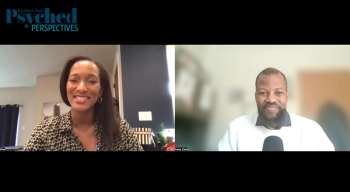
Taking Up Space
A nurse practitioner discusses author James Baldwin and the importance of moving from fear toward self-advocacy and self-love.
BLACK HISTORY MONTH
In honor of Black History Month, we asked clinicians to share their thoughts on Black history and the contributions of Black Americans to the psychiatric field and beyond. Here’s how they answered.
Every February, going back to my childhood years, I have grown a greater understanding of what Black History Month means to me. The more I grow this understanding, the more I grow a sense of self-gratitude. There are numerous men, women, and children who have paved the way not only to create opportunities for myself, but also to challenge the status quo.
As a Black male nurse practitioner, I am the minority in my profession. Throughout my years in higher education, I have found myself in a space of insecurity and self-doubt in addition to imposter syndrome and survival mode. Out of fear, I found myself taking action by being the smaller energy—by not taking up space and by perseverating on how others thought of me in both clinical and classroom settings.
Although today I believe that this level of action was disadvantageous for me, at the time, I thought these acts were the most appropriate in a society that has historically made Black individuals believe that they were a threat to others’ spaces.
With the help of therapy, mentorship, self-reflection, and an even further appreciation of Black history, I gently guided myself out of the state of fear and more toward a state of self-advocacy and self-love. I came to the revelation that those who make up Black history took up space—either by engaging in civil disobedience, by working in the arts or academia, or just by showing up. Taking up space, self-advocacy, self-love, and gratitude are all pillars of Black history, and Black history is American history.
When I think of Black history figures, I find myself reviewing James Baldwin and his works. Baldwin made himself known with the gift of gab and with his written poems, essays, and novels. Although I do not have any literary gifts or accolades, when I think of someone who took up space, I think of Baldwin. The way in which he posed his arguments, the symbolism of his writings, and his overall influence helped make Black history as influential as it is today.
In fact, I attribute Baldwin’s work with being the primary reason I grew out of my fear of taking up space. The way in which he eloquently and confidently advocated for the Black community was so potent that I found myself growing out the shrinking space of the smaller energy and developing a deeper sense of purpose within the scope of health care advocacy and equity.
One Baldwin quote that significantly resonates with me is the following: “Love takes off the masks we fear we cannot live without and know we cannot live within.”1 With this quote in mind, I have found that love supersedes fear, and it opens new ways of thinking that are good-natured and virtuous.
I aspire to continue to advocate for those who find themselves in either a transient or a constant fear of taking up space, and for who find themselves in the minority in their professions. I make my life meaningful when I can help anyone find meaning in their lives. Black History Month is a profound reminder of the individuals who have helped me understand that taking up space in a positive, self-loving way is a movement toward optimal change.
Mr Marcellin is a nurse practitioner and founder and chief executive officer at Mission Wellness Psychiatry, PLLC.
Reference
1. Baldwin J.
Newsletter
Receive trusted psychiatric news, expert analysis, and clinical insights — subscribe today to support your practice and your patients.







